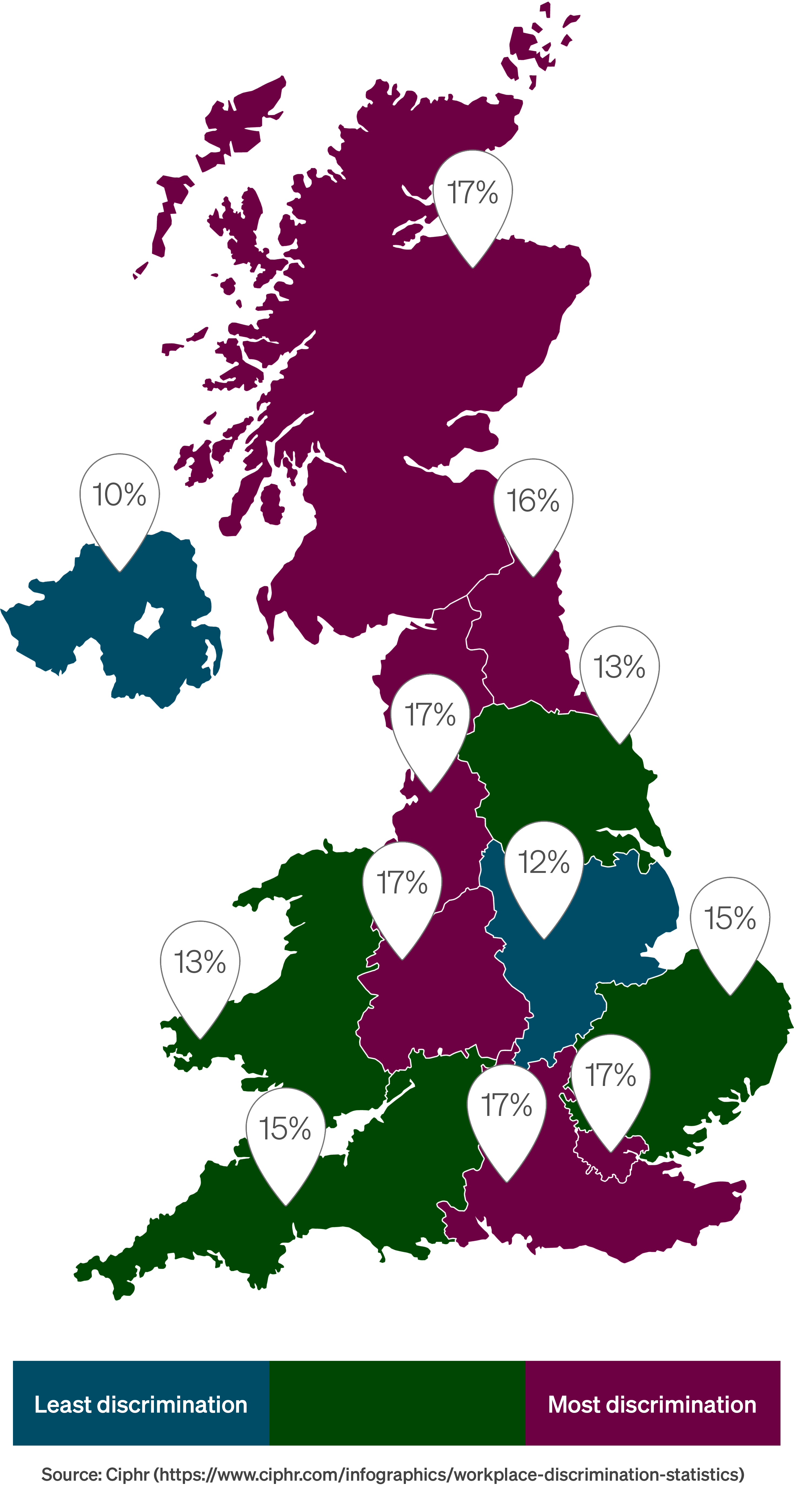Discrimination in the workplace has a significant impact on the lives of many people every day. But just how pervasive is workplace discrimination in the UK today?
HR and payroll software provider Ciphr commissioned a survey of 4,000 adults in the UK to find out how many people have been affected by discrimination at work (or when applying for jobs) and the types of discrimination that most people have faced.
Ciphr's new (2025) research into the most prevalent forms of discrimination in the UK found that:
- Over two fifths (45%) of UK adults say they have experienced some form of workplace discrimination — either in the workplace (38%) or when applying for new jobs (39%) or both
- Over two thirds (69%) of survey respondents from ethnic minorities (excluding white minorities) say they have experienced some form of discrimination in the workplace (61%) or when applying for a new job (65%) or both. And over one in four (29%) feel that their race or ethnicity has been a factor in not getting some jobs they've applied for
- The most common form of discrimination, cited by all respondents, is ageism. Nearly one in seven (15%) people reported feeling that their age was a factor for not getting some jobs they’ve applied for. And around one in 12 (8%) say they’ve experienced workplace discrimination based on their age
- Women are almost twice as likely as men to report feeling discriminated against because of their gender. On average, nearly one in seven (15%) women in the UK say they've experienced sexism in their working lives, compared to one in 12 (8.5%) men
- Nearly three quarters (73%) of surveyed non-binary people have faced some form of discrimination at work or when job hunting
- Over half (59%) of people aged 18-34 say that they’ve been subject to hiring discrimination of some kind. This age group is also among the most likely to say they have experienced discrimination at work (57% vs 31% of people aged 35 years and older)
- Londoners face more discrimination than most. People living in the London region are more likely to say they have been discriminated against either at work or when applying for work (or both) than those living in any other part of the UK (57% vs the survey average of 45%)
- People working in hospitality are among the most likely to say they've experienced workplace discrimination of some kind (75% vs the survey average of 45%)
- And one in seven (14%) UK adults with parental and/or caring responsibilities feel they have faced discrimination during the recruitment process (ie not got a job) because of their family status (having a child or children and/or providing care for a disabled, older or ill relative or friend)
Quick links:
- How common is workplace discrimination in the UK?
- What are the most commonly reported types of workplace discrimination in the UK?
- Perceptions of sexism and ageism at work
- Which industries report the highest rates of workplace discrimination?
- Workplace discrimination around the UK
- Unfair dismissal statistics in the UK



How many UK adults have experienced discrimination at work?
Ciphr commissioned OnePoll to survey 4,000 adults to discover how many people living in the UK have experienced discrimination at work or when seeking work.
Question relating to discrimination in recruitment:
Which, if any, of the following statements apply to you? [Select all that apply]
- I feel my age has been a factor in my not getting jobs I've applied for (15% of 4,000 survey respondents)
- I feel my physical appearance / how I look has been a factor in my not getting jobs I've applied for (9.4%)
- I feel my gender has been a factor in my not getting jobs I've applied for (7.8%)
- I feel my family status (having a child/children or other caring responsibilities) has been a factor in my not getting jobs I've applied for (7.3%)
- I feel my accent or dialect / how I sound has been a factor in my not getting jobs I've applied for (7.2%)
- I feel my race or ethnicity has been a factor in my not getting jobs I've applied for (6.4%)
- I feel my disability has been a factor in my not getting jobs I've applied for (5.5%)
- I feel my religion or belief has been a factor in my not getting jobs I've applied for (3.9%)
- I feel my sexual orientation has been a factor in my not getting jobs I've applied for (3.7%)
- I feel my criminal record has been a factor in my not getting jobs I've applied for (2.8%)
- I have been discriminated against during the recruitment process for another reason (6.5%)
- None of the above (57%)
- N/A - I've never applied for a job (1.4%)
- Prefer not to say (2.6%)
Question relating to discrimination at work:
Which, if any, of the following statements apply to you? [Select all that apply]
- I feel my age has made it harder to succeed at work (11% of 4,000 survey respondents)
- I have been discriminated against at work because of my age (8.4%)
- I feel my gender has made it harder to succeed at work (7.2%)
- I have been discriminated against at work because of my gender (7%)
- I have been discriminated against at work because of my physical appearance / how I look (6.8%)
- I have been discriminated against at work because of my race or ethnicity (5.6%)
- I have been discriminated against at work because of a disability (5.1%)
- I have been discriminated against at work because of my accent or dialect / how I sound (3.7%)
- I have been discriminated against at work because of my religion or belief (3.4%)
- I have been discriminated against at work because of my sexual orientation (3.1%)
- I have been discriminated against at work because of my ‘family status’ – having a child/children or other caring responsibilities (6.1%)
- I have been discriminated against at work because of my ‘family status’ – not having a child/children or other caring responsibilities (5.3%)
- I have been discriminated against at work for another reason (5.3%)
- None of the above – I have never experienced discrimination at work (55%)
- N/A - I've never been employed (1.8%)
- Prefer not to say (4.6%)
Ciphr commissioned OnePoll to survey 4,000 UK adults (nationally representative by age, gender and region). 2,000 people were surveyed between 31 July and 5 August 2024, and a further 2,000 were surveyed between 5-13 November 2024. The results from both surveys were then combined.
According to the results, more than one in three (38%) UK adults feel they have been subject to discrimination at work.
And a similar number – nearly two-fifths of those surveyed (39%) – feel they've been turned down from a job due to discrimination of some kind.
Just 55% of surveyed adults say they haven't experienced discrimination at work.
In August 2021, when Ciphr ran an almost identical survey, that figure (the proportion of people who haven't suffered workplace discrimination) was 60%. This could suggest that workplace discrimination in the UK is on the increase (or perhaps it's just being called out, or recognised, more now).
45% of UK adults have faced workplace discrimination
That total rises significantly for people from ethnic minority groups, with over three in five having experienced discrimination at work
...and two in three having experienced hiring discrimination
Share of UK adults, by ethnicity, who feel they've not got a job due to discrimination of some kind during the recruitment process
Our survey also found that:
- Half (50%) of UK employees say they have experienced workplace discrimination of some kind – either at work and/or during the recruitment process (this rises to 54% among part time workers)
- Over a third (35%) of self-employed workers report experiencing some form of workplace discrimination
- Nearly two-thirds (64%) of students in the UK say they’ve experienced discrimination when applying for a job
- As have over half of people who are currently unemployed – 51% think that they have faced hiring bias (and been discriminated against when job hunting) at some point in their career
Gen-Z adults are the most likely to report having experienced discrimination at their previous, prospective or current workplaces.
Two-thirds (66%) of 18- to 24-year-olds and over half (55%) of those aged 25-34 feel that they have been discriminated against when job hunting.
.png?width=1200&length=1200&name=Ciphr%20workplace%20discrimination%20statistics%202025%20%235@2x%20(1).png)
.png?width=1200&length=1200&name=Ciphr%20workplace%20discrimination%20statistics%202025%20%234@2x%20(2).png)

What is the biggest reason for discrimination in the workplace?
As part of Ciphr's investigation into workplace discrimination, we looked at the main reasons people reported for feeling unfairly discriminated against at work or when applying for a new job.
To be clear, it's unlawful to discriminate against any person (workers or job applicants) on the grounds of age, disability, gender reassignment, marriage and civil partnership, pregnancy and maternity, race, religion or belief, sex, or sexual orientation. These are protected characteristics under the Equality Act 2010.
Ciphr's workplace discrimination survey asked individuals about their experiences (if any) of negative discrimination (like discriminatory attitudes and behaviours or unfavourable treatment) at previous, prospective or current workplaces.
Here are some of the key findings:
- The most common discriminating factor reported, by nearly one in five (19%) survey respondents, was age. One in seven (15%) adults in the UK feel that their age has been a discriminating factor or obstacle when job hunting. And more than one in 12 (8.4%) believe they’ve suffered workplace discrimination or been treated differently based on their age
- The second most common reason people gave for discrimination at work or during the recruitment process was appearance bias (or 'lookism'). Around one in 11 (9.4%) survey respondents feel that their physical appearance and how they look has been a factor in not getting some jobs they've applied for
- Gender discrimination also appears to be rife in many UK workplaces, with one in eight (12%) UK adults saying they’ve experienced hiring discrimination or unfavourable treatment at work on the basis of their gender. Over one in four (27%) non-binary people have faced gender discrimination at work and when applying for work
- More women than men reported feeling that they’ve been refused a job due to gender discrimination (10% vs 5%)
- More men than women reported feeling that they’ve been refused a job due to ageism (17% vs 14%)
- People from ethnic minorities communities (excluding white minorities) are significantly more likely to have faced racism in their careers than white people (34% vs 5.2%). Nearly two in five (39%) people of Black, Black British, Caribbean or African ethnicity, and one in three (31%) Asian or Asian British people, reported experiencing work-related discrimination on the grounds of their race or ethnicity
Check out the list of the most common types of discrimination experienced by adults in the UK in the chart below.
And keep scrolling for infographics showing Ciphr's workplace discrimination survey findings for different ethnic groups, and different age groups.
Most commonly reported reasons for work-related discrimination, based on a nationally representative survey of 4,000 adults in the UK.
Share of people who feel they have experienced some form of work-related discrimination by reason.
Based on Ciphr's 2024 workplace discrimination survey, the most prevalent types of work-related discrimination in the UK (for all respondents) are age discrimination, appearance discrimination and gender discrimination.
Nearly one in five (19%) people reported feeling discriminated against at work or as a job applicant because of their age, and around one in eight because of their appearance or gender (13% and 12% respectively).
A further one in nine (11%) survey respondents believe they have faced unfair treatment and discrimination at work, or when job hunting, because of their parenting and/or caring responsibilities (supporting an ill or disabled relative, for example). People aged 25-44 years old are the most likely to feel they've been affected by this form of discrimination as a job applicant (12% vs the survey average of 7.3%).
One in 11 people in the UK has also experienced discrimination at work, or as a job applicant, because of their race or ethnicity, or accent (9.3% and 8.8% respectively). But it's well over twice that rate for survey respondents from ethnic minorities (excluding white minorities) – with one in three (34%) having suffered race discrimination and one in six (18%) accent discrimination.
Other reported types of workplace discrimination (impacting people at work or when job hunting) include:
- Disability discrimination (8.2%)
- Religion or belief discrimination (6.1%)
- Sexual orientation discrimination (5.8%)
- Criminal record discrimination (during hiring process, 2.8%)
- Another reason (10%)
One in 20 (5.3%) UK adults also report feeling discriminated against at work because they don't have any parental or other caring responsibilities.
Share of people who feel they have experienced some form of discrimination when looking for a new job
Share of people who say they have experienced discrimination at work by reason
People from an ethnic minority background are nearly twice as likely to have experienced discrimination in their working lives than white people
Other survey findings:
- Ageism at work or when job hunting affects over one in four (29%) young people aged 18 to 24 years, compared to one in six (18%) people aged 25 and above
- One in six (17%) 18-44 year olds feel they've been discriminated against at work, or when applying for work, because of their parental or caring responsibilities
- Conversely, one in nine (11%) 25-34 year olds reported feeling discriminated against at work because they don't have a child or children, or other caring responsibilities
Two-thirds (65%) of 18- to 34-year-olds report having experienced discriminatory attitudes and behaviours at work or as a job applicant



Where in the UK do people report experiencing the most workplace discrimination?
-
 London
London -
 South West England
South West England -
 Scotland
Scotland
We took a closer look at where our 4,000 survey respondents live, to determine which parts of the UK report experiencing the most work-related discrimination.
The region with the highest rates of workplace discrimination is London, where a staggering 57% of adults say they’ve experienced work-related discrimination of some kind (either at work or when applying for work or both).
London is followed by the North East, Scotland, and the South West, where over two-fifths (46%) of people feel they’ve been discriminated against at work or turned down from a job due to discrimination.
Age discrimination is the most common form of workplace discrimination experienced across every region of the UK.
Chart showing how peoples' experiences of workplace discrimination differs across the UK → → →

Chart showing how job hunters' experience of age discrimination differs across the UK → → →
Based on Ciphr's workplace discrimination survey, the regions with the highest reported rates of hiring ageism are Scotland, London, the South East, North West, and West Midlands. Nearly one in six (17%) of people in these parts of the UK feel their age has been a factor in not getting some jobs they've applied for.

Londoners face more workplace discrimination than most
Half (57%) of the adults living in the London region – home to around 8.8 million people – report experiencing discrimination at work and/or when applying for work. That’s well above the UK average (of 45%).
The most common forms of workplace discrimination – reported by around one in five people living in Greater London, are:
- Age discrimination (23%)
- Parenting or caring discrimination (19%)
- Appearance discrimination (19%)
- Race or ethnicity discrimination (19%)
- Gender discrimination (17%)
Notably, one in nine (11%) Londoners also feel that they have been discriminated against at work because they do not have any parental or other caring responsibilities.

Half of employees have experienced discrimination at work
Unsurprisingly, people currently in full or part-time employment are more likely than some other survey respondents to self-report experiences of work-related discrimination.
Around half of full- and part-time employees (48% and 54% respectively) feel they have been affected by discrimination at work or didn't get a job because of discriminatory attitudes (on one occasion or more). This contrasts to around one in three (35%) people who are self-employed.
The main reasons that employees cited for feeling discriminated against (either at work or when job hunting) was age (one in five of those surveyed), followed by appearance (one in six), then gender (one in seven).
People working in senior roles are the most likely to report feeling discriminated against. Nearly three-fifths (59%) of business leaders (including owners, CEOs and MDs) and senior managers say they have experienced some form of discrimination at work. This compares to just under half (47%) of junior and middle managers, two-fifths (41%) of supervisors, and less than a third (29%) of non-management staff.
The top reason that leaders and senior managers gave for feeling that they'd been discriminated against at work was not having a child or children, or other caring responsibilities (cited by 17% of survey respondents in senior roles vs the survey average of 7.5% for all employees).
The next few charts (see below) include the survey results for employed UK adults only ↓↓↓
Over half (54%) of part-time employees and nearly half (48%) of full-time employees say they have experienced some form of discrimination in the workplace or when applying for new jobs
Gender disparities and perceptions of ageism at work
The results of Ciphr's survey suggest that:
- Women are more likely to be impacted by gender discrimination than men during their working lives. One in eight (12%) female employees, compared to one in 15 (6.6%) male employees, feel that they've been turned down for some jobs they've applied for on the grounds of their gender
- Women are also nearly twice as likely as men to think that their gender has made it harder to succeed at work (11% of surveyed female employees vs 5.8% of surveyed male employees). That figure is even higher for female managers, at 14% (vs 7% of male managers)
- A third (33%) of non-binary people feel that their gender has made it harder to succeed at work
- Male employees are more likely than female employees to think that their age has made it harder to succeed at work (14% vs 11%). This is despite age discrimination at work appearing to affect a similar number of men and women in the UK (8.2% vs 8.6%)
Female employees are almost twice as likely as men to feel that their gender has made it harder to succeed at work. While male employees are more likely to feel that their age has made it harder to succeed at work
One in seven (14%) female managers say their gender has made it harder for them to succeed at work, compared to one in 14 (7%) male managers
According to Ciphr's research, just 3.2% of male employees in non-management roles, and 7% of male managers, believe that their gender has hindered their career success. But this doubles to 7.7% and 14% for women in these roles respectively
Generally, most people don't feel that their age or gender has impeded their career success. But that's not the case for all employees – particularly women working in management roles.
Ciphr's study shows that one in seven (14%) female managers, on average, think their gender has made it harder to succeed at work.
In comparison, just one in 14 (7%) male managers thought the same about their gender.
Female managers are also more likely to have been discriminated against because of their gender. Nearly one in four (23%) of all female managers surveyed by Ciphr have faced gender discrimination in their careers, compared to one in seven (14%) male managers surveyed.
Female managers working in the legal industry are four times more likely to say that they’ve faced gender obstacles and gender discrimination in their careers than their male counterparts (42% vs 10% respectively).
It’s a similar story for those employed in energy and utilities (33% of female managers vs 11% of male managers think their gender has made it tougher to succeed); transport and logistics (21% vs 3.1%); property and construction (20% vs 5%); business, consulting and management (20% vs 10%); and engineering and manufacturing (16% vs 1.4%).
Check out the chart below, to see the figures for your industry ↓↓↓
Chart showing manager's experiences of gender bias at work (by industry)
Share of employees (in different industries) who think their gender or age has made it harder to succeed at work
People working in the media, law enforcement and security, and the performing arts are the most likely to perceive gender disparities in their profession – 31%, 29% and 17% of survey respondents in these industries feel that their gender has made success at work harder (vs the survey average of 8.6% for all employees).
People working in business, consulting and management, recruitment and HR, and leisure, sport and tourism, are among the most likely to perceive ageism in their industries – 20%, 19%, and 17% of survey respondents in these sectors feel that their age has made career success harder to achieve (vs the survey average of 12% for all employees).



Which industries report the most workplace discrimination?
Analysis of Ciphr's workplace discrimination survey results (for 2,630 UK workers) shows which industries report the highest rates of discrimination at work.
The survey found that a large share of people working in information research and analysis (79%), hospitality and event management (75%), business, consulting and management (66%), the media (62%), and creative arts and design (61%) have experienced discrimination of some kind at their current or previous place of work, or felt discriminated against in some way by a prospective employer (see chart below for figures).
The sectors reporting the highest prevalence of discrimination at work* (based on the experiences of the people working in them):
- Age discrimination appears to be more prevalent in the performing arts, marketing, advertising and PR, and recruitment and HR (reported by 25%, 17% and 16% of survey respondents working in these sectors respectively)
- Appearance discrimination (or 'lookism') appears to be more prevalent in the media, hospitality and events management, environment and agriculture, and business, consulting and management (23%, 20%, 17% and 16% respectively)
- Gender discrimination appears to be more prevalent in law enforcement and security, the performing arts, and charity and voluntary work (18%, 17% and 16% respectively)
- Parenting / caring discrimination appears to be more prevalent in information research and analysis, and hospitality and events management (25% and 20% respectively)
- Race or ethnicity discrimination appears to be more prevalent in information technology (IT) and energy and utilities, followed by sales, and law enforcement and security (16%, 16%, 12% and 12% respectively)
- Accent discrimination appears to be more prevalent in publishing and journalism, environment and agriculture, science and pharmaceuticals, and IT (9.1%, 8.3%, 8.3% and 7.9% respectively)
- Disability discrimination appears to be more prevalent in hospitality and events management, leisure, sport and tourism, charity and voluntary work, and business, consulting and management (16%, 14%, 11% and 10% respectively)
- Religion or belief discrimination appears to be more prevalent in business, consulting and management, and information research and analysis, followed by IT (11%, 11% and 10% respectively)
- Sexual orientation discrimination appears to be more prevalent in hospitality and events management, the performing arts, business, consulting and management, IT, and the media (13% then 8% each respectively)
- Non-parent discrimination† appears to be more prevalent in information research and analysis, hospitality and events management, and business, consulting and management (29%, 21% and 16% respectively)
The people most likely to say that they have never experienced discrimination at work* include those working in science and pharmaceuticals (75% of survey respondents in this sector), insurance and pensions (71%), property and construction (68%), the law (63%), public services and administration (61%), and teaching and education (61%).
*Includes results for discrimination at work only, not discrimination as a job applicant
†Survey respondents who reported feeling discriminated against at work because they don't have a child or children, or other caring responsibilities
Share of employees (in different industries) who have experienced some form of discrimination at work and/or when job hunting
The most common forms of hiring discrimination reported by people working in different industries


.png?width=1200&length=1200&name=Ciphr%20workplace%20discrimination%20statistics%202025%20%2315@2x%20(1).png)
How many employment tribunals take place as a result of job discrimination in the UK?
Workplace disputes can often lead to employment tribunals, where the matter is heard and a decision is made on how the complaint(s) should be resolved. Employment tribunals take place for a wide range of reasons, such as breaches of contract, unfair dismissals, discrimination, unauthorised deductions from wages, and public interest disclosures.
Under the Equality Act 2010, employers must ensure that they do not unfairly discriminate in any aspect of work (this includes direct discrimination, indirect discrimination, harassment, sexual harassment, and victimisation). They have a ‘duty of care’ to look after their employees’ wellbeing and must take steps to prevent discrimination and reasonable steps to protect people from discrimination. Organisations can also be held accountable, under 'vicarious liability', for the discriminatory or unfavourable actions of their employees.
But how often are employment disputes related to discriminatory attitudes and behaviours at work brought to a tribunal in the UK? And what are the most common employment tribunal claims?
To find out, Ciphr’s researchers analysed tribunal statistics from His Majesty’s Courts & Tribunals Service going back to 2017.
In the year to March 2024, the Employment Tribunals received over 97,000 total claims – that’s about 1,800 claim receipts per week. Many may not progress to a full tribunal hearing though, as claimants may withdraw their claim, the claim may be dismissed, or the claim may be settled out of court (through ACAS, for example).
Our analysis found that:
- Over a third (or 33,118) of the 89,716 employment tribunal claims lodged between October 2022 and September 2023 related to discrimination or inequality, including equal pay, age discrimination, disability discrimination, race discrimination, religion or belief discrimination, sex discrimination, sexual orientation discrimination, and pregnancy discrimination (unfair dismissal during pregnancy or maternity leave)
- One of the most common complaints brought to employment tribunals during that time was disputes related to equal pay (15% or 13,594)
- The most common type of discrimination claims reaching tribunal in the year to September 2023 were those relating to disability discrimination (8.2% or 7,312), followed by race discrimination (4.4% or 3,963) and disputes relating to discrimination on the basis of sex (4.2% or 3,771). Sex discrimination claims also include marriage and civil partnership and gender reassignment complaints
- There were 270 discrimination cases where compensation was awarded in the year to March 2024
Number of discrimination claims accepted at employment tribunal (in the year to September 2023)
What’s the average payout for workplace discrimination?
Compensation totals vary significantly from case to case and are based on factors such as financial loss, injury to feelings, personal injury and aggravated damages.
In the 2023/24 reporting year (April 2023 to March 2024):
- The form of discrimination with the highest average claim award was age discrimination, which had an average (mean) payout of £102,891. 12 age discrimination claims were awarded compensation
- The highest maximum award was £995,127 for a claim involving sex discrimination. 71 sex discrimination claims were awarded compensation, with an average award of £53,403
- 52 race discrimination claims were awarded compensation, with an average award of £29,532
- 124 disability discrimination claims were awarded compensation, with an average award of £44,483
- 7 sexual orientation discrimination claims were awarded compensation, with an average award of £27,070
- And 3 religious discrimination claims were awarded compensation, with an average award of £10,750
How has workplace discrimination changed over time?
To find out how discrimination in the workplace has changed over time, we examined the Ministry of Justice tribunals statistics for the past six years (to September 2023, as that’s the latest monthly employment tribunal receipts that are available at the time of writing).
Analysis of the data shows that:
- Total claims accepted at tribunal increased by 23%, from 73,213 to 89,716 in the year to September 2023. The number of discrimination and equal pay claims, however, stayed relatively static (increasing by just 0.4%, from 32,970 to 33,118)
- Tribunal disputes relating to ageism at work decreased by -17% between October 2022 and September 2023 (from 2,450 to 2,031)
- But, during the Covid-19 pandemic, the number of age discrimination claims taken to employment tribunal rocketed – with 11,174 ageism claims accepted in October 2021 alone
- Tribunal claims related to equal pay have more than halved (-55%), decreasing from 30,231 to 13,594 in the six years to September 2023
- The number of sex discrimination claims reaching tribunal also fell by a similar rate (-59%) between October 2017 and September 2023, from 9,309 down to 3,771
- Employment disputes related to discrimination on the grounds of a disability or disabilities, race and sexual orientation have all increased (by 12% to 7,312 claims, 16% to 3,963 claims, and 16% to 491 claims respectively) in the six years to September 2023
Chart tracking changes in the number of discrimination claims accepted at employment tribunal between October 2018 and September 2023
Unfair dismissal statistics in the UK
All employees at UK workplaces have the right to not be dismissed unfairly. Tribunal hearings for unfair dismissals can take place for a wide variety of reasons and when successful, can result in thousands of pounds of compensation.
Our research found that:
- In the year to September 2023, 16,527 unfair dismissal claims reached tribunal (total for England, Wales and Scotland)
- The average (mean) compensation award for employment tribunals involving unfair dismissals in 2023/24 was £13,749, with the maximum award being £179,124 (646 unfair dismissal claims were awarded compensation in that reporting year)
Unfair dismissals are closely linked to discrimination, with many cases often involving bias or unfair treatment of some kind. This could be due to a range of factors, such as pregnancy, an individual’s request to take time off work for family reasons, being forced to take compulsory retirement, or even because they were involved in whistleblowing.
Chart tracking changes in the number of unfair dismissal claims accepted at employment tribunal between October 2021 and September 2023
Given that nearly half (45%) of adults in the UK have experienced workplace discrimination during their careers, we wanted to find out how many people consider making a claim for discrimination or unfair dismissal. Or, more specifically, how many people search online for information and advice around discrimination at work, hiring bias, and/or unfair dismissals.
To do this, we analysed Google searches using Semrush. Here’s our findings:
- Around 61,030 searches for phrases and questions containing the term ‘unfair dismissal’ are conducted online in the UK every month. Some of the most common searches include ‘unfair dismissal’ (8,100 average monthly searches in the year to January 2025), ‘unfair dismissal claim’ (1,900), ‘unfair dismissal compensation’ (1,300), and ‘unfair dismissal under 2 years’ (1,300)
- The term ‘employment tribunal’ nets even more results, averaging 93,370 monthly searches. Popular searches include ‘employment tribunal’ (12,100), ‘employment tribunal rules (880), and ‘employment tribunal costs’ (720)
- There's a considerable number of searches for 'bullying at work' (15,540 a month, on average), 'harassment in the workplace' (7,610), and ‘unfair treatment at work’ (2,680). As well as thousands of monthly searches for terms including ‘workplace discrimination’ (3,930) and ‘discrimination at work’ (9,560)
- According to Google's Keyword Planner, searches for the term ‘discrimination at work’ are on the rise, increasing from an average of 16,200 for the year in 2021 to 18,000 in 2024
- Google searches of 'disability discrimination in the workplace', 'gender discrimination in the workplace', 'age discrimination in the workplace', 'ageism at work', and 'racism in the workplace' are also up since 2021
To put this in context, there are over half a million (543,060) average monthly searches (in the year to January 2025) for terms that include the word 'discrimination' in the UK (according to Semrush). While each search does not necessarily correspond to, or represent, a different individual (as one person may search for the same term multiple times), that’s a huge number of searches. And, likely, a lot of people doing the searching – suggesting that experiences of unfair discrimination are widespread.
What can employers do?
We asked Ann Allcock, Ciphr's head of diversity and an experienced EDI consultant and trainer, to outline some of the actions that organisations can take to protect their (former, current and future) employees from workplace discrimination:
Employers can act on a number of levels to reduce the risk of discrimination occurring, and to ensure that it is appropriately addressed when it does. There are four key areas of focus that cut across both individual and organisational responsibilities: awareness and understanding of discrimination; what discrimination looks like in your organisation; best practice policies and procedures; and mindsets of responsibility, enquiry and speaking up.
Here are some specific best-practice suggestions:
What exactly is discrimination, where does it come from, how can it show up, and what’s the legal context?
Educate your leaders and staff on key principles, on the different types of discrimination, and on the law. Share examples that show what discrimination looks like. Explain that employees can be liable for discriminatory acts, alongside their employer. Talk about harassment as a form of discrimination and enable discussions about other ways in which discrimination can occur.
Teach about bias, stereotyping and prejudice and the potential for them to play out in discrimination. Bias can show up in unexpected ways, which aren’t directly or obviously related to the Equality Act protected characteristics. For example, accents can trigger stereotypes and accent bias is when those stereotypes are used to make judgements about someone’s competence or skills. While accent isn’t a legally protected characteristic, it’s often used as a signal for other characteristics that are (eg ethnicity).
What do you know about the reality of discrimination in your organisation?
Review the routes and processes that currently tell you about employee experiences. Do they give you full and honest feedback on the risks and reality of discrimination? Set up ways for staff to be heard (perhaps via employee networks or resource groups), and listen in particular to those who may be discriminated against. Include questions about discriminatory experiences or outcomes in engagement surveys. And make it clear that you welcome and will appropriately act on feedback about concerns or incidents, however ‘small’ or ‘insignificant’ they may seem to be.
Conduct diversity monitoring to scope the demographics of your workforce and then use this to identify employment and workforce trends and outcomes that could signal discriminatory processes or discriminatory behaviours. For example, are there anomalies in performance review scores across genders? Or does your people data show varied leaver patterns across different protected characteristic groups? What part could discrimination be playing in driving or contributing to unequal outcomes?
How robust and effective are your policies, reporting routes and investigation processes?
Ensure that your Diversity, Equity, Inclusion and Belonging Policy, or similar, clearly commits to both anti-discrimination and to firmly addressing individual discriminatory acts. Spell out what this means in practice for different aspects of employment and everyday line management, such as recruitment processes and work allocation.
Set up and communicate ways in which employees can raise or report discrimination-related issues or obtain guidance or support, and spell out processes through which these issues will be dealt with.
How strong is the mindset of fairness, equality and equity, and the speak-up culture?
Embed a speak-up culture! This exists when people in an organisation feel that it’s safe to share their concerns and to report discriminatory or inappropriate behaviour or practices. Employers should make it clear that they want and expect employees to share concerns and experiences, embed the principle of speaking up in organisational values, and enable reporting through purposeful leadership action to set the tone and remove barriers or reluctance on the part of staff.
Support routine reflection on the opportunities to reduce the risk of discrimination and unequal outcomes or negative experiences within everyday practice. Regularly review the impact of your policies and ways of working through an equity lens, using a formal assessment process and/or by encouraging and normalising an equity-enquiry mindset. Make the most of AI-powered tools to reduce bias in recruitment, for example.

"It’s vital that employers focus their efforts on tailored actions and training to both prevent discrimination and to address it robustly where it does occur. And recommit to principles of fairness, respect and equity, setting expectations for all employees – implemented from the top down – around behaviours, policy development and everyday practice."
Ann Allcock
Head of diversity, Ciphr
Ciphr eLearning
Ciphr's eLearning, powered by Marshalls, boasts a comprehensive range of off-the-shelf diversity and inclusion training, designed to empower organisations with the necessary knowledge and tools to successfully build a speak-up culture that is transparent, positive and supportive.
Notes
Ciphr commissioned OnePoll to conduct an independent survey of 4,000 UK adults (nationally representative by age, gender and region). Two surveys ran between 31 July and 5 August 2024, and 5-13 November 2024, with the results from both (2,000 + 2,000) combined.
Over half (51.7%) of respondents identify as female, 48% identify as male, and 0.3% identify as non-binary (0.05% opted for 'prefer not to say').
Around two-fifths (61%) of respondents are currently employed, 5% are self-employed, 5% are unemployed, 3% are students, 4% are homemakers, and over a fifth (22%) are retired.
A quarter (25%) of employed survey respondents work in leadership or senior management roles at their organisations, 22% work in middle management positions, 13% in junior management, 14% are supervisors, and 27% work in non-managerial or junior roles.
One in 10 respondents are aged 18-24 years, 17% are 25-34-years, 17% are 35-44 years, 16% are 45-54 years, 17% are 55-64 years and 24% are 65+ years old.
One in seven (14%) survey respondents are from ethnic minorities (excluding white minorities) and 86% are white:
- Arab: 0.1% of survey respondents
- Asian or Asian British
– Bangladeshi: 0.4%
– Chinese: 0.9%
– Indian: 1.8%
– Pakistani: 1.4%
– Other Asian: 0.8% - Black or Black British
– African: 5.2%
– Caribbean: 1.2%
– Other Black: 0.3% - Mixed or Multiple ethnic groups
– White and Asian: 0.7%
– White and Black African: 0.5%
– White and Black Caribbean: 0.6%
– Other Mixed or Multiple ethnic groups: 0.2% - White
– British: 81%
– Gypsy or Irish traveller: 0.1%
– Irish: 1.7%
– Roma: 0.1%
– Other White: 2.7% - Any other ethnic group: 0.1%
- Prefer not to say: 0.6%
All statistics have been rounded to the nearest integer or one decimal place. Totals may not sum due to rounding.
Ministry of Justice - Tribunal statistics quarterly (October and December 2024 editions) and Annex C: Employment Tribunal Receipts Tables (released in December 2023): https://bit.ly/40kJkr2
Office for National Statistics – Mid-2023 estimates of the population for the UK, England, Wales, Scotland and Northern Ireland (released on 8 October 2024): https://bit.ly/3CjnRH1Fair use statement: If you are interested in sharing these statistics, or quoting this study in an article, please include a link to this infographic page and credit Ciphr. Thanks.
This infographic was published in February 2025 (and updated on 6 March 2025, with further data and analysis). It replaced an earlier version published in September 2021.



























